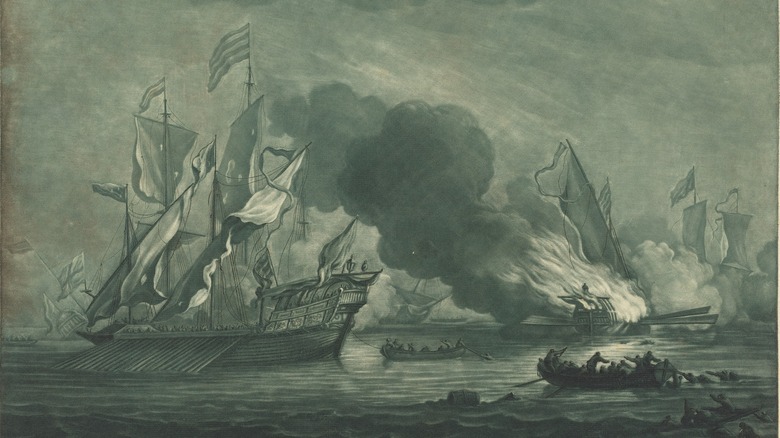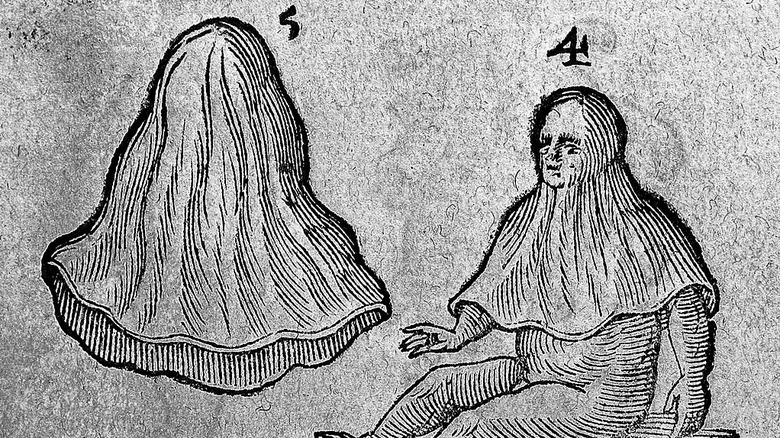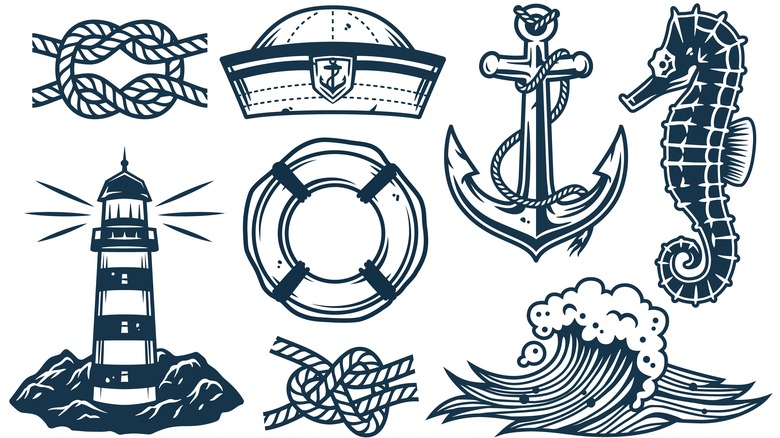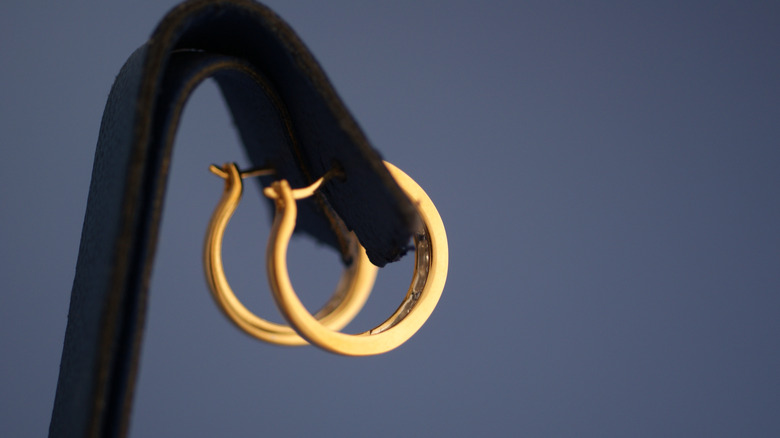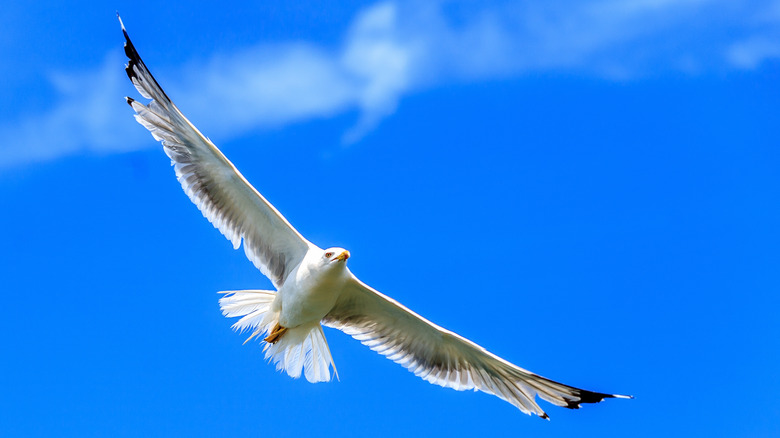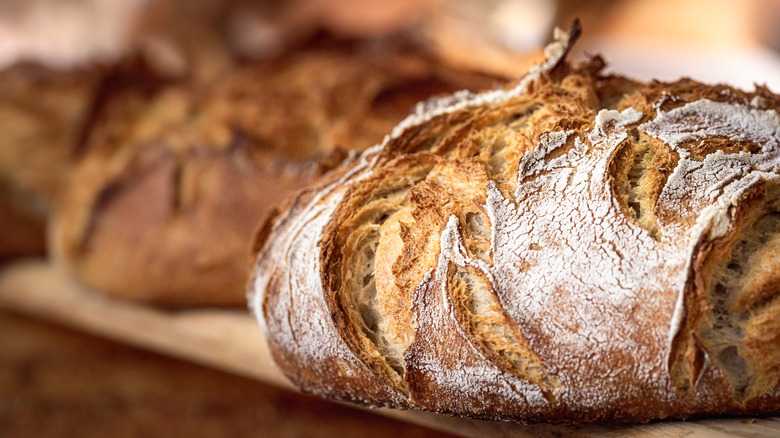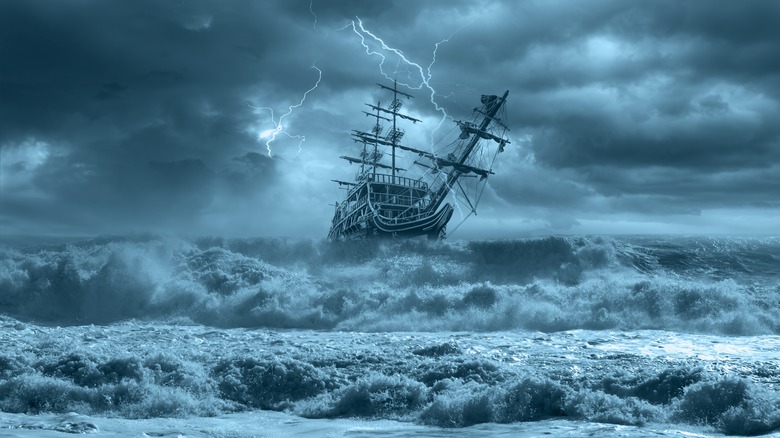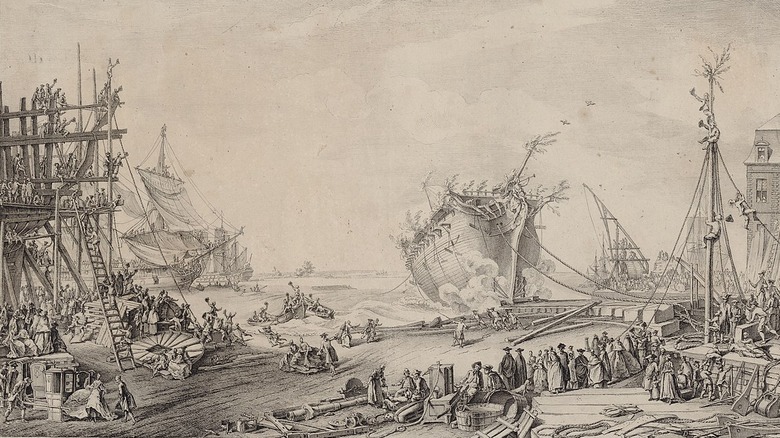Old Sailing Superstitions That Go Back Centuries
Everyone's at least a little superstitious, right? Just little rituals or signs that point to either good or bad luck in the near future — it's a perfectly normal thing. But if you want to start looking for the most superstitious folks around, then maybe you'd best look away from the land and instead turn your eye to the sea.
Sailors really do have quite the collection of superstitions, rituals, and omens — it's seriously an extensive list. But, in a way, maybe it shouldn't be all too surprising. After all, sailors have quite the harrowing profession, basically handing their safety and well-being over to the whims of the weather and the sea. It's only fair that they have a few good luck charms to help them on their way, or a number of seeming portents of bad luck passed down through the years in the form of sailors' stories. And, besides, those old tales formed the basis for a unique culture that could only take shape on a ship, further building a sense of camaraderie (via Early American Studies).
That said, this apparent oral tradition means that it's pretty hard to track down the exact origins of many a sailor superstition — there are more than a few cases where these are just short bits of wisdom without a clear explanation as to why they exist. Regardless, there are some ideas out there as to where these superstitions came from.
The caul of a newborn baby is lucky
Here's a bit of a strange one, and a decent place to start is a question: Just what is a caul? According to the Liverpool Museum, the caul is a part of the birth membrane that can be found covering a newborn child's face, but "can" is the operative word here: Most of the time, babies are born without a caul. The rarity of this situation led to a belief that the child would benefit from a lifetime of good luck. Not only that, people started to think that the caul itself could bring good luck to those who came to possess it.
As summarized in Fletcher S. Bassett's "Sea Phantoms," sailors took a liking to this particular good luck charm, believing that it bestowed its owner with the supernatural ability to avoid drowning and shipwrecks. Given just how important that was for people who spent their lives at sea, that's quite the boon, and sailors took this seriously, sometimes sewing the caul into their clothes — even if that piece of clothing was their pants — and putting ads in local newspapers, selling the caul to new sailors.
As for when this superstition arose? That's hard to say exactly. People ascribed enough power to cauls for them to be left behind in wills as early as the mid-1600s, and Icelandic tradition claimed that the caul even had a soul of its own, but the first referenced connection to sailing was noted in 1797.
Breaking eggshells keeps witches away
So here's a superstition that goes back quite a long time — back to ancient Roman times, in fact, albeit in perhaps a slightly different form. Historian Willow Winsham (via Folklore Thursday) points to a reference made all the way back in the first century by Pliny, who claimed that eggshells should always be broken, lest people be susceptible to curses left by witches.
But just what does that have to do with sailors? Well, if you jump forward in time by a thousand years, then you can start finding connections between witches and boats. More specifically, Winsham quotes Reginald Scot's "Discoverie of Witchcraft," which explains that witches could actually sail the seven seas using unbroken eggshells as their boats. (Quite a different image from witches flying on broomsticks, isn't it?) Beyond that, witches also had an apparent reputation for messing with innocent ships in particular — a crime levied at the accused during the infamous witch trials of the 16th and 17th centuries.
And so what could sailors do but beg those they knew to always remember to crush their eggshells? Winsham quotes Elizabeth Fleming's poem "Eggshells" from 1936: "Oh, never leave your egg-shells unbroken in the cup; Think of us poor sailor-men and always smash them up, For witches come and find them and sail away to sea, And make a lot of misery for mariners like me." It seems sailors feared much more than just the open seas.
Tattoos bring good luck
Tattoos are quite the normal sight even on land, but did you know that they became so popular in Western culture largely because of sailors? According to Rollins, James Cook and his crew first witnessed the art back in 1769 (although tattoos had existed for thousands of years by then). They adopted it themselves and began ascribing different meanings to their tattoos.
While many tattoos denoted specific accomplishments, there are also a whole slew of tattoos that are meant to provide luck to their bearers. A compass could ensure that a sailor was able to make it home safely, and the words "Hold fast" tattooed across the knuckles would help a sailor do just that when they had to keep the rigging in hand.
But one of the stranger tattoos might just be the dual images of the rooster and pig. The two animals are said to keep sailors safe from drowning, but the origins of this particular tradition are hard to pin down. The most popular take points to a common tale of pigs and roosters typically being the only animals to survive a shipwreck. That survival could be attributed to the buoyant wooden crates that the two animals were often shipped in, although Tattooseo also mentions that some believed their survival to be an act of God. Or, maybe, the tradition comes from an old saying: "Pig on the knee, safety at sea. A cock on the right, never lose a fight."
Red skies could mean fair or foul weather
"Red sky at night, sailor's delight. Red sky in morning, sailor's warning" really does sound like quite the superstition, with red skies being an ominous portent of the things to come, almost like the kinds of lines you hear in dramatic fantasy movies. Not only that, it's a saying that's stood the test of time. According to the Library of Congress, Shakespeare's "Venus and Adonis" contains a very similar warning, as does the Bible (although the latter doesn't make reference to sailors). Quite the longstanding belief.
Here's something interesting, though: For as much as the saying sounds like it's referencing something potentially supernatural, in reality, it's just science. You see, sunlight is technically made up of all colors of light, but blue light gets scattered more easily than red. In other words, when light has to pass through more air particles, it starts appearing red to the eye (if you've ever wondered why the sky is blue during the day but red at sunrise and sunset, that's why!).
Furthermore, air currents tend to move from west to east, with high pressure (or red skies) equating to fair weather, and low pressure equating to foul weather. As such, a red night sky means that the sun is shining through a high-pressure system — good weather is on the way. But a red morning sky? That means good weather is a thing of the past, and a storm might be brewing.
Earrings could cure health conditions
You may already be familiar with the image of pirates sporting a golden hoop earring, but that's not purely a creation by the entertainment industry. For that matter, it wasn't a trend only for pirates but rather sailors at large, and it wasn't just meant as a fashion statement.
See, according to LiveScience, sailors believed that golden earrings could cure a number of maladies, such as blindness and seasickness, or prevent drowning — quite the helpful thing for people who spent their lives on the ocean, right? And that belief probably didn't come from nowhere. After all, Medievalists explains that back in the Middle Ages, gold was actually seen as medicine on its own. Physicians would even prescribe cures that used bits of gold — among other precious metals — to treat any number of medical issues, from leprosy to heart or eye diseases. There were even entire instruction sets on how to prepare gold for medicinal use.
That said, this particular belief about gold began to lose traction around the 18th century, so there's also the possibility that the tradition continued for slightly less superstitious reasons. For example, gold earrings were no small expense, so they could be used to pay for a sailor's funeral, should they die at sea. There was even the practice of sailors engraving their hometown into their earrings as something of a safety precaution. That way, no matter who might come across their body, they could eventually find their way home again.
Killing an albatross spelled danger
If you're a sailor, you'd best think twice before killing an albatross. After all, you might actually be killing a person, or at the very least endangering the entire crew. Diana Wells' "100 Birds and How They Got Their Names" explains that the albatross' graceful flight led sailors of the past to believe that they were "incarnations of wandering souls," and Chieftain Training further adds that they were the souls of sailors long since dead. Seeing one was actually a sign of good luck, as the birds were thought to act as the guardian angels of the sea, keeping a ship and her crew safe. So, naturally, killing one would invite misfortune.
That last belief can be directly traced back to Samuel Taylor Coleridge's famous 1834 poem "The Rime of the Ancient Mariner." In it, the titular mariner shoots an albatross, only for the crew to then be subjected to horrific luck: A complete lack of wind effectively stranded the ship at sea as the crew ran out of drinking water, after which they were attacked, nearly the entire crew dying in the process.
That said, Coleridge's poem might not be the source of this superstition. Wells posits that, if nothing else, Coleridge possibly based his poem on a 1719 incident where a sailor killed an albatross and his ship subsequently experienced bad luck. After that, the sailor was hanged for privateering — perhaps inspiration for the dead albatross being hung around the ancient mariner's neck?
Bread had many meanings
According to Fletcher S. Bassett's "Sea Phantoms," plenty of maritime superstitions somehow revolve around bread. Seriously, there's a lot of lore about what bread could do. In England, bread baked on Good Friday was considered inherently lucky, which meant that they also made good gifts to sailors. Bread was also a common offering, thrown directly into the sea to hopefully improve weather conditions. Conversely, failing to offer bread to the sea could result in bad luck. Then, there's the old English belief that upside-down bread could directly lead to shipwrecks.
Unfortunately, Bassett doesn't really explore the origins of any of these beliefs, but that doesn't mean there aren't connections. That English belief about upside-down bread? It's strangely similar to a French belief said to originate from the Middle Ages. Flavors of Paris traces it back to stories that bakers were forced to bake bread for executioners, an act that led those bakers to fill their bread with hatred. Those especially hate-filled loaves were then turned upside-down, just to make sure everyone knew which ones to avoid.
More generally, history gives further credence to why bread would feature in so many maritime superstitions. It's been a staple food source for thousands of years, playing a huge part in the survival of cultures all across the globe. Given that bread also features heavily in religious beliefs (Christianity being a rather accessible example), is it really so surprising that sailors would ascribe their own importance to it?
Whistling invited storms
Whistling a fun little tune is the kind of thing that generally seems like a perfectly acceptable idea, right? Well, if you're on a ship, then maybe it's best if you don't. As summarized by Fletcher S. Bassett's "Sea Phantoms," whistling while on board a ship was something of a sticky situation. Most of the time, it outright wasn't allowed, as the sound of whistling could kick up terrible storms and dangerous winds; in some cases, more specifically, those whistles were thought to invoke the devil himself. That said, if someone just had to whistle, then there were ways to do it safely and invite only a gentle breeze — hug the mast or flatter the winds themselves, and you should be safe.
As for the reasons behind this superstition, well, the easiest place to look might be longstanding cultural traditions. According to the Daily Sabah, whistling has kind of always been attached to superstitions and bad luck in general. All across the world — Asia, the Middle East, Europe — there are beliefs that whistling could summon evil spirits and ghosts of the dead, or else just invite misfortune into a person's life. There are many other variations of this belief, too, but the common thread between them is a poor ending.
In modern times, things are a little different. Whistling for fun is discouraged on ships, but the reasons are practical: Whistles can be a means of communication, so it's best not to add confusion, and loud whistles could wake sailors sleeping below deck (via Massachusetts Maritime Academy).
Don't change a ship's name
What's in a name? The question can go a lot of ways, but when it comes to ships, it seems that names mean a whole lot. In fact, they're so important that changing a ship's name isn't something to be taken lightly.
Generally speaking, Jonathan Eyers explains in "Don't Shoot the Albatross!" that renaming a ship is just a way to start courting misfortune — a piece of advice passed down and known by all sailors. The reason for that? Well, legend says that the names of all ships are kept in a "Ledger of the Deep," managed by the ancient Greek god of the sea himself, Poseidon — or Neptune, if you're a Roman mythology buff (via Boat Names Australia). Changing the name of a ship was tantamount to trying to deceive the mighty sea god, and annoying that particular god really wasn't in the best interest of sailors for obvious reasons. That said, if a name change couldn't be avoided, then truly extensive (and occasionally disgusting) ceremonies had to be carried out first.
As for when this belief originated? Eyers quotes Robert Louis Stevenson's "Treasure Island," which included this advice back in the 1880s — "What a ship was christened, so let her stay!" — and further adds that sailors abided by this rule throughout the Age of Sail (approximately the mid-16th century to the mid-19th century). Given the belief was widespread during that time, it may date back even further.
Bananas don't belong on board
To almost everyone who spends their time on land, the banana is a centerpiece for physical humor — who hasn't seen the joke about people slipping on banana peels? On a ship, though? Bananas are a very different story, and many sailors associate the little yellow fruit with bad luck.
It turns out this particular superstition has a historical basis. Hubbard's Marina claims that the superstition arose back in the 1700s, coinciding with the rise of the banana trade. This might be exaggerated, though, since other sources, such as "A Socio-Economic History of the International Banana Trade, 1870-1930" (via the European University Institute), actually point to the banana trade beginning to boom in the 1800s. Nonetheless, for those ships unfortunate enough to be carrying bananas, misfortune just kept befalling them — deaths, shipwrecks, fires, and gruesome ends all around. And other ships that came upon the site of a wreck were treated to an ominous sight: a sea of floating bananas, but no ship to be seen.
Ultimately, the superstition was based on real danger. Bananas ripen and rot quickly, and the byproducts of that process can cause problems. Ethene gas causes other fruits in the hold to rot faster, and alcohols from subsequent fermentation could easily catch fire. Not only that, bananas were sometimes home to spiders, which could bite sailors and cause sickness or, on occasion, death. In the present, refrigeration has solved these problems, but that doesn't mean the superstition has disappeared.
